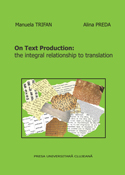
| PREDA Alina, TRIFAN Manuela | |||||
| ON TEXT PRODUCTION: THE INTEGRAL RELATIONSHIP TO TRANSLATION | |||||
| TRADUCTOLOGIA | |||||
| 978-973-610-766-5 | |||||
| 2008 | |||||
| DISPONIBIL LA CERERE |
|
||||
| REZUMAT: |
Translation studies is probably one of the most challenging linguistic fields. This should come as no surprise to those who have even the least amount of experience in the field. First and foremost, translating presupposes making a choice, or, to be more exact, a series of choices: any translation is, in fact, just one variant chosen out of a number of possible versions. There are many ways of stating one and the same idea, and each possible variant hides different shades of meaning.
The role of translators is to make the best possible choice of wording, taking into account the numerous factors involved in any act of communication:
• Who are they translating for? • Is the target audience a factor that should determine the translation procedure? • What are the significant features of the audience’s profile that must be taken into consideration when translating? • What features of the text are relevant for translators in their attempt to create a high-quality translation? • What is the type of text, its concern and its purpose and what are the translation requirements in each case? • What function is the text meant to perform and how does text-function awareness influence the translation process? • Is form essential, must it be preserved, or is content the all-important element? These are some of the most important issues that translators must take into consideration if their endeavour is to be successful. And, after these questions have been given an answer, it all comes down to text production, a skill that every translator should possess. |